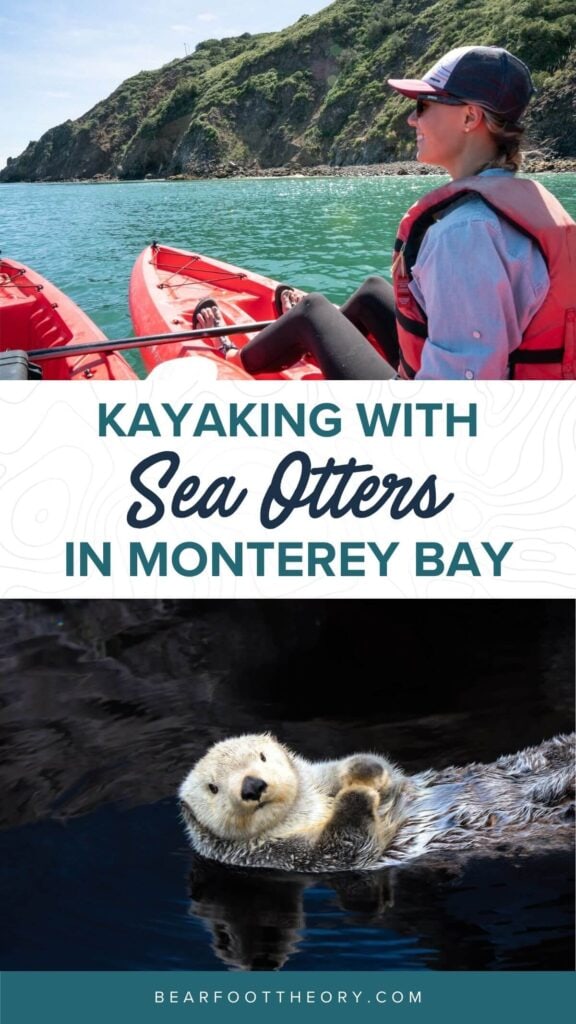Products You May Like
The Southern sea otter – also known as the California sea otter – is far and away my favorite animal. With its thick fur, sweet smile, and loving care of its young, the sea otter delights observers with its twisting dives and playful nature.
When I was offered the opportunity to encounter sea otters in the wild, I jumped on a plane to Monterey, hopped into a kayak, and spent a memorable day floating in the kelp forest with these charismatic creatures. The habitat of the California sea otter stretches from San Mateo County in the north, down to Santa Barbara.
The current total population of California sea otters hovers around 3,000 animals. While it is possible to encounter sea otters all along this stretch of the California coastline, Monterey Bay is home to the highest concentration of sea otters. In fact, there are around 500 in the Bay and the Elkhorn Slough estuary, so you are almost guaranteed to spot a few furry friends if you get out on the water.
Learn how to kayak with Monterery Bay sea otters and get up close and personal with these adorable creatures.
About California Sea Otters
California sea otters are considered a keystone species: their health is an indicator of the overall well-being of the other species in the ecosystem and of their habitats. On average, the Southern sea otter measures 5 feet and 50-70 pounds and is the smallest marine mammal in North America.
Sea otters have no blubber to keep them warm, but very thick fur, measuring one million hairs per square inch. For comparison, most humans have less than 100,000 hairs on their heads. Otters’ thick fur led trappers to hunt the mammals to near extinction in the 17th and 18th centuries, as their coats – nicknamed ‘soft gold’ were prized for gloves and other outerwear.
The 1911 Fur Seal Treaty put a stop to the hunting of fur seals and sea otters, but experts believe the total current population of California sea otters is about 1% of their numbers before hunting began. Due both to their near extinction from being hunted, and the close proximity of their habitat to humans, the California sea otter remains a threatened species.
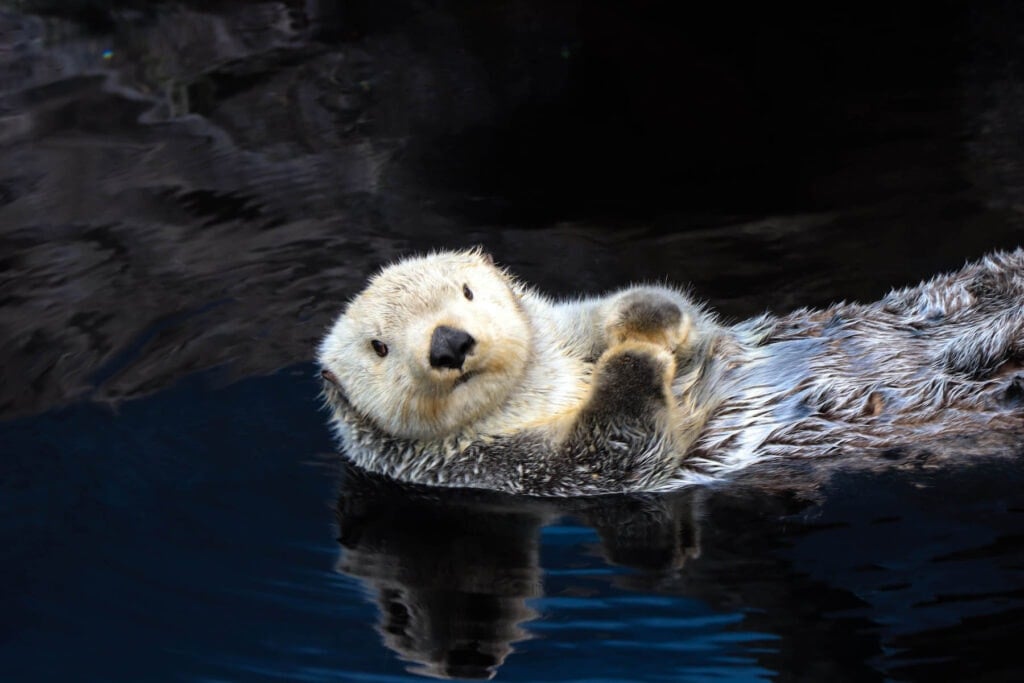
Sea otters have an extremely high metabolism and need to eat constantly to keep warm. In fact, they eat 25-30% of their weight each day in sea urchins as well as a wide variety of mussels, clams, crabs, and other invertebrates. By grazing on sea urchins, sea otters protect the giant kelp, a favorite snack of the urchins. The hungry purple urchins have decimated these vital marine forests, creating what are called “urchin barrens” where nothing else can live. The sea otters keep the urchin population in check, and the kelp supports a rich community of plants and animals.
The healthy ecosystem and plentiful kelp forest of Monterey Bay are due in large part to the presence of the protected sea otter population.
About Monterey Bay
The Monterey Bay National Marine Sanctuary was designated in 1992, protecting a vast wildlife reserve and ecosystem. It’s the largest marine sanctuary in the United States.
Monterey Bay is home to the largest expanse of kelp beds in the country, which are populated with crabs, octopus, and hundreds of species of fish as well as 34 different marine mammals including sea lions, seals, dolphins, whales, and of course, sea otters.
One of North America’s largest underwater canyons, Monterey Bay is considered one of the most productive marine ecosystems in the world.
Kayaking with Monterey Bay Sea Otters
The town of Monterey hosts several sea kayak tour outfitters. The kind folks at Adventures by the Sea, an outdoor recreation company that has been operating for over three decades, outfitted my friend Karen and me for our kayak tour. Our guide, Jan, has been leading sea kayak tours in Monterey for over twenty years. Her calm and expert knowledge of all the local wildlife enhanced the experience. We could have just rented kayaks and gone out on our own, but Jan’s running commentary provided useful and interesting facts and observations.
Almost immediately after launching off a floating dock, we turned the corner in the harbor and saw a small raft of sea otters resting among the sailboats and yachts.
Jan told us to stay five kayak lengths away from the otters. Their fur is so thick that when they are resting, they need to clean themselves and dry out their fur. This process can take hours and when the otters get scared, they dive underwater and must begin the drying process all over, which is exhausting.
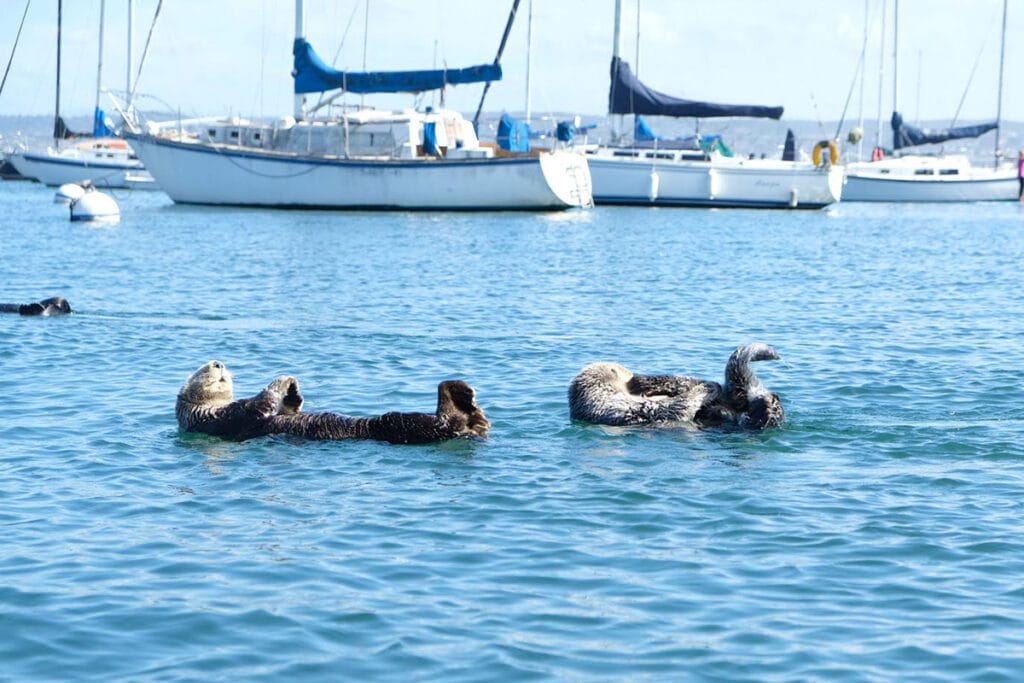
From a distance, we watched as the otters rolled and dove. There were dozens of mama and pup pairs in the Bay the day of our tour. The mamas were teaching their adolescent-looking pups to dive; at times the mamas would grab their babe by the scruff to distance themselves from our kayaks. When a mama got separated from her young, she rose halfway out of the water and made a screeching call, “where are you?” and almost immediately her pup surfaced for a cheerful reunion.
As we left the harbor, the breaker wall was lined with cormorants, gulls, sea lions, and harbor seals. The collection of sea mammal sounds and smells heightened the contrast between the adult toys docked in the marina and the wild side of Monterey Bay.
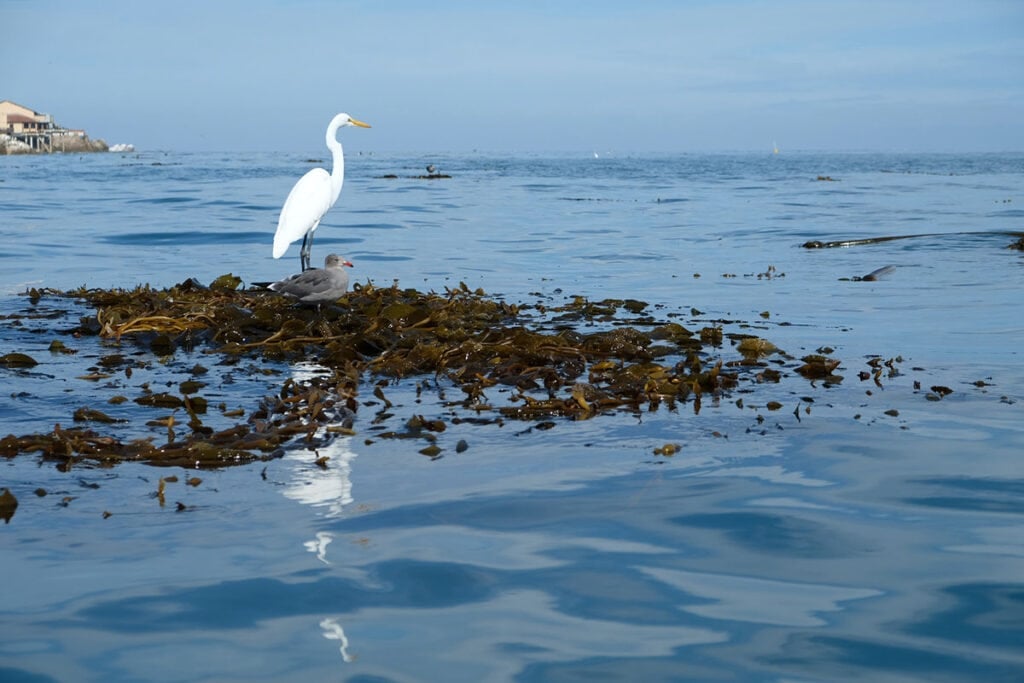
Our group paddled toward Cannery Row and encountered a kelp forest. Sea otters use the kelp to rest, anchoring themselves to the long strands of giant kelp that are attached to the seafloor. The otters will raft up, nestling into the kelp to groom, eat and chill out with their friends. The mamas often tie up their pups in the kelp when they hunt, and otters frequently hold hands to keep from floating away.
I floated next to one small raft of otters for quite some time. I could feel how the kelp kept my sit-on-top-kayak stable despite the sizeable waves and foam. We just floated there together. Some other groups of otters were too nervous when I approached, even at a healthy distance. The mamas took off almost immediately. But this one white-faced otter and I just hung out together in the California sun. She turned and wiggled, searching for a comfy spot in her kelp bed. At times she even put up her feet/flippers to rest, taking in the beautiful morning and her human floating friend.
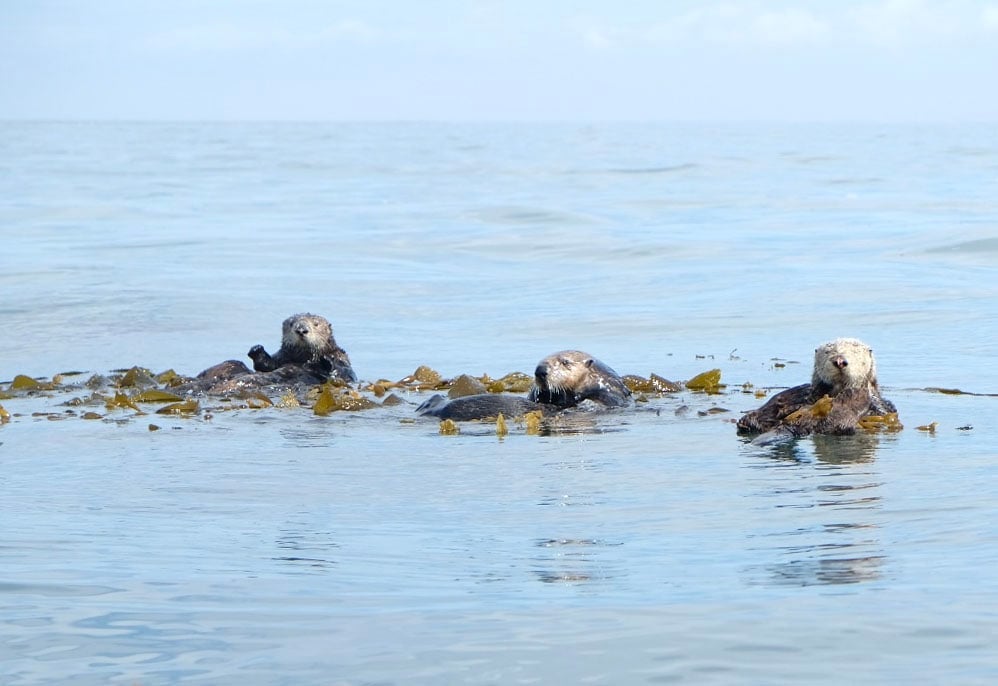
What to bring kayaking with sea otters in Monterey Bay
Layers are important when kayaking in Monterey Bay. Due to the ever-changing marine layer, it can be quite cold and foggy, even on a summer morning, and then warmer in the afternoon. Make sure to bring the following:
I would also make a strong recommendation for a change of clothes so you can change immediately after your kayak tour. We ended up with wet backsides and I wished I had brought a change of clothes with me.
Water shoes or sandals are helpful but not necessary. I went barefoot because I really didn’t want to get my sneakers wet. Adventures by the Sea has dry bags available to use during the tour, but if you go kayaking on your own you’ll likely want to bring your own dry bag.
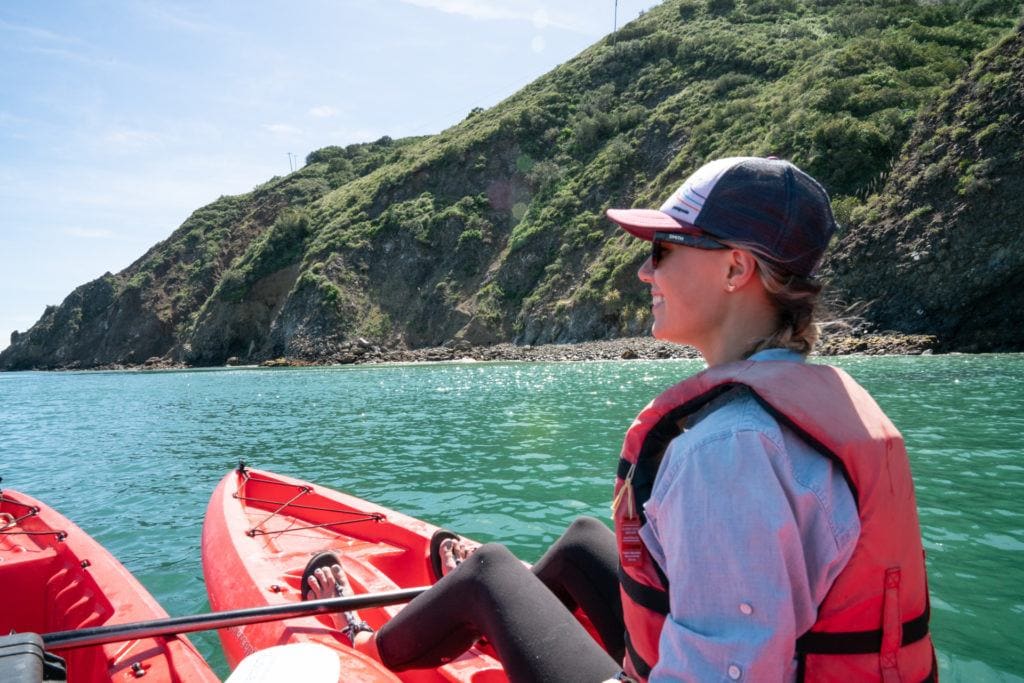
When to go kayaking with sea otters in Monterey Bay
Mornings tend to be calmer in Monterey Bay, which is preferable both for paddling and wildlife viewing. The winds often build throughout the day, so an afternoon paddle can become a bit more treacherous. There are days when the reverse is true; it can be windy in the morning and calm in the afternoon. It’s best to watch the water, the weather report and be flexible. Our tour was scheduled long before the trip, but we ended up kayaking a day earlier because a giant wind and rainstorm came through on the day of our originally scheduled tour.
Sea otters live in Monterey Bay year-round and are often visible even from the docks and walkways on Cannery Row. I was very pleased to see otter mamas and pups in October, but the best time for viewing baby otters is late March through August.
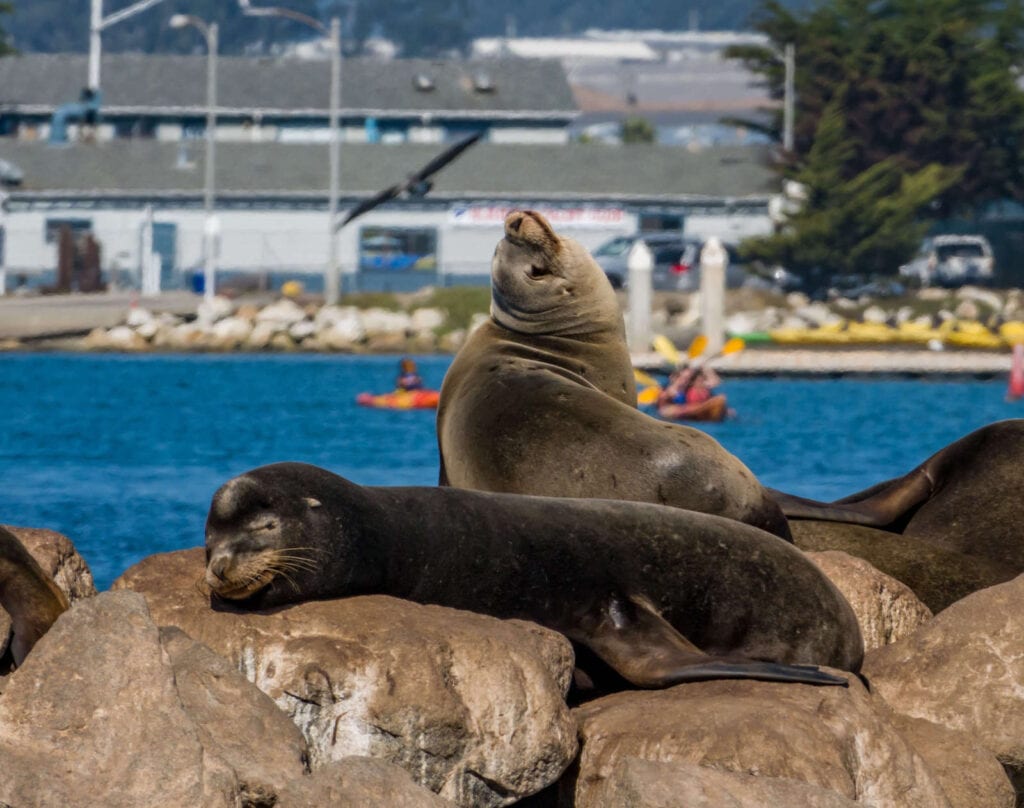
What to Expect When Kayaking with Sea Otters in Monterey Bay
Sea kayaking using the sit-on-top kayak is pretty forgiving. They are easy to navigate, and Adventures by the Sea offers basic paddling instructions prior to each tour. Kids between 5 – 14 years old are welcome to join a tour in a tandem kayak, and folks 14 and up can use a single. Out in the Bay, kayakers can use the kelp just like the otters to raft up and rest, especially when the waves roll through or the wind picks up. Make sure to keep 50 feet or more distance from all area marine life. Sea otters are wild animals, and you don’t want to startle or disturb them.
Even though our scheduled tour was set for only two hours, close to the turnaround time Jan said we could return the kayaks whenever we wanted. Karen and I could have stayed out all day. Long after our tour ended, we paddled back, a major bucket list item having been checked off.
The raft of otters who hang out in the marina were there to say goodbye. It’s not just that the southern sea otter is cute, but it’s like they know me. They are the embodiment of all I hope to be – joyful, intelligent, and a really good mom.
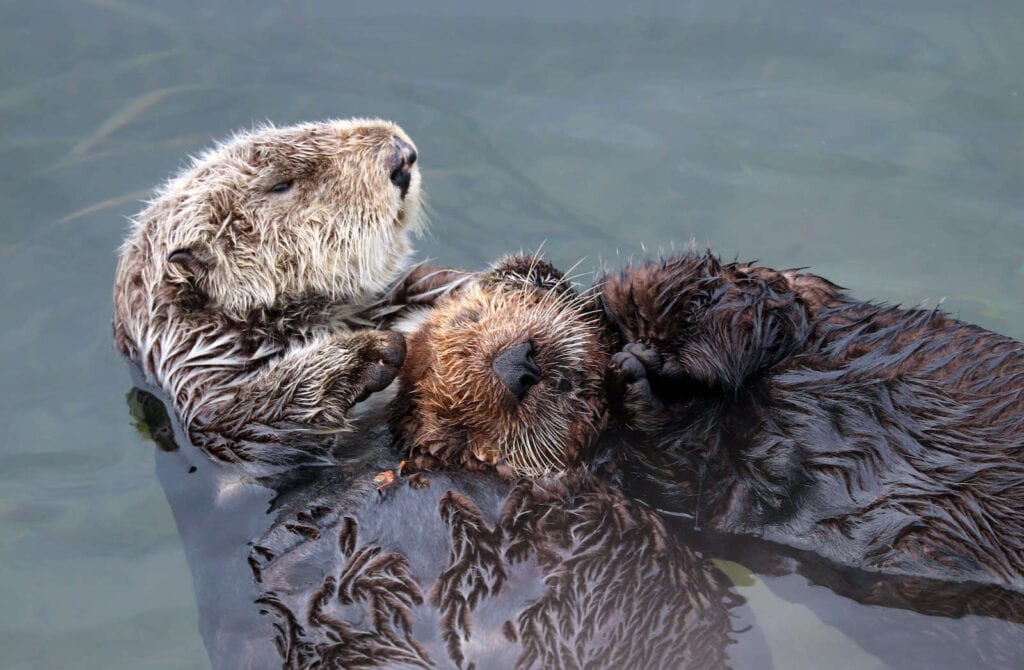
What questions do you have about kayaking with Monterey Bay sea otters? Is this something you’d want to do? Let us know in the comments!
